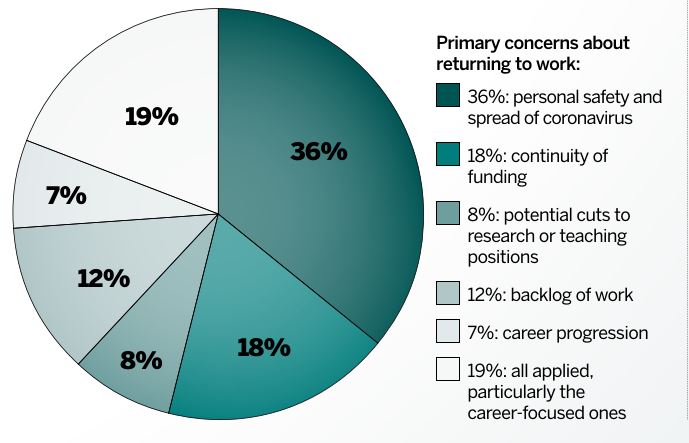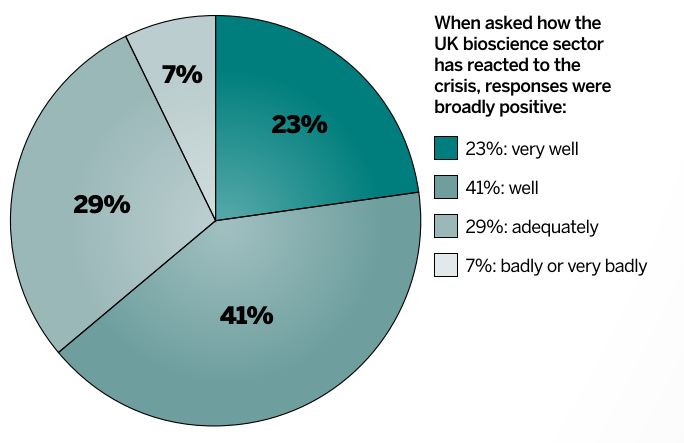Coping with COVID

Laura Bellingan explores responses to an RSB survey that found three-quarters of UK researchers have had to abandon or suspend research due to COVID-19
28th September 2020
To begin to build a picture of what the events of 2020 will mean for bioscience researchers, the Society circulated a survey between late May and early June, and received more than 500 replies. While clearly there are many matters relevant to biologists, including teaching and learning – which have been high priorities for the RSB during lockdown – the purpose of this survey was to focus on researchers. Thanks to all who responded – we are working now to address the issues you raised and to understand what the data tells us about the impacts of the pandemic on research.
Most respondents (80%) were UK-based, at universities (54%), within industry (13%) or research institutes (7%), and across the service sector, education, government and NGOs. The majority worked in clinical and biomedical sciences (40%) with a further 35% evenly spread across environmental, molecular and ecological sciences. Importantly, three-quarters (74%) of UK respondents had to abandon or suspend experiments or fieldwork due to the crisis – in some cases anticipating losing a year’s work – and cancelled international data-collecting and collaboration trips. Further, researchers abroad needed to be repatriated. Research that has a seasonal link was under additional time pressure.
Of our respondents, 33% had funding from business sources, 27% from charities, 36% from UKRI and 35% from other public (government) sources. Twenty-three per cent were professors, 8% lecturers or senior lecturers and 2% early career lecturers. A further 7% were technicians or senior technicians, 9% postdocs and 14% postgraduate or PhD students. Almost half of UK respondents (45%) felt that they could resume work when lockdown measures were lifted, but an additional 39% anticipated that this would be with significant time/data loss. A partial return to laboratories had begun by early June, but the research time available was generally seen as inadequate.
 Results from the RSB's survey of over 500 life scientists, conducted throughout May and June.
Results from the RSB's survey of over 500 life scientists, conducted throughout May and June. Work worries
In terms of the primary concerns about returning to work, 36% cited personal safety and spread of the coronavirus, 18% highlighted continuity of funding for research positions, projects or programmes, while 8% cited potential cuts to research or teaching positions. The looming backlog of work concerned 12% and career progression was a primary worry for 7%. Many respondents who didn’t choose a primary concern said all applied, particularly the career-focused ones. We were interested in understanding the proportion of researchers who had switched to working on COVID-19: 4% had completely and 25% partially. Those working on COVID described a huge range of projects, both building on existing work and adapting existing skills. Of the 12% who had sought funding for COVID-19 research, 17% found it easy or very easy to do so, and 47% moderately easy.
When asked how the UK bioscience sector had handled the crisis, responses were broadly positive, with 23% opting for ‘very well’, 41% ‘well’ and 29% rating it as ‘adequate’. Although only 7% considered it bad or very bad, this is nonetheless a worrying peer assessment and we will consider it. Comments frequently noted that the early offers of help from the bioscience community were not effectively exploited because of a lack of capacity to coordinate at a national level. Fewer international respondents (60%) had to abandon or suspend experiments or fieldwork due to the COVID-19 crisis than those in the UK, and also rated the UK bioscience sector response to the crisis positively – 10% very well, 44% well and 37% adequately, with 8% and 1% opting for badly and very badly respectively.
In terms of opportunities, many respondents to our survey saw advantages in the shift to digital communication and online working, with fewer finding a lack of access to resources and remoteness from colleagues difficult. Some saw the lockdown effects as limited and manageable, with opportunities to write papers and achieve new balance, but more saw a bleaker picture. In-person interactions were missed and the extensive time needed to develop online teaching and to provide postgraduate student support and motivation halted research.
Home environments are not always suitable for work physically, emotionally or in terms of the digital access that can be achieved. Caring responsibilities for children, or elderly or ill family members, clearly made home working almost impossible for some. Those whose own health required shielding said they were concerned that this is now a disadvantage that could limit their future prospects: a number expressed job and salary insecurity and associated financial worries. All of these are worrying from the perspective of inclusivity, diversity and fairness.
 Survey respondents were largely positive about the sector's response to the crisis overall.
Survey respondents were largely positive about the sector's response to the crisis overall. Research into COVID-19 is urgently needed and has been conducted with unprecedented openness and collaboration. However, other areas have suffered setbacks and researchers are telling us to keep teaching, research and work beyond COVID-19 in the spotlight and the funding frame. There is an urgent need to address the insecurity faced by PhD students, postdocs and researchers on fixed-term contracts who may be unable to complete projects. The offer of no-cost extensions concerns some, who worry they may be without pay or a realistic chance of reaching project targets – clearly much more communication and negotiation is needed on this.
We are pleased that so many (70%) appreciated the COVID-19 information-sharing that the Society escalated during lockdown to arm biologists of all specialisms with information to counter misinformation. However, 21% were unaware (which is concerning as only 3% were not members) and 8% did not rate the service useful, so we will examine where improvements can be made.
Building bridges
The need for a more supportive research culture was being recognised before COVID-19. Now even greater effort is needed to bridge the differences in lockdown experience that could marginalise talented researchers just when we need our best foundations. COVID-19 and lockdown impacts will not disappear once institutions reopen, so a return to ‘normal’ could be a recipe for failure. We must recognise that ‘normal’ was very far from perfect and to ‘build back better’ we must genuinely address our existing problems and inequalities – some of which amplified the severity of the crisis and others that COVID-19 made temporarily invisible.
There is much to be concerned about in the information we gathered in our survey, but it is better to end on a note of hope, which enables progress. In the words of one respondent: “I have lost some momentum, but I will bounce back.” And another: “Wherever there are scientists, thinking and working hard, there is hope.”
Dr Laura Bellingan FRSB is the RSB's Director of Policy and Public Affairs


